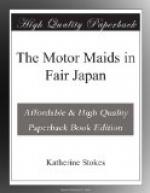“She certainly did want to get you into a peck of trouble, Miss Nancy,” said Mr. Campbell bringing the famous raincoat from the passage where it hung on the hat rack. “Here’s your coat. She left it behind as a souvenir yesterday when she broke into the house to steal my drawings. I fooled her, though,” he added, smiling sweetly. “If she thinks she can ever make anything out of those papers, she’ll soon find she has been losing time.”
“It’s the third time she’s been here masquerading as you, Nancy.” broke in Billie. “She must have managed the disguise perfectly because the servants were fooled each time.”
“She did,” said Mary. “I asked Onoye exactly what she looked like. She evidently had on a brown curly wig and a hat like Nancy’s with a blue veil around her head.”
At this juncture in the conversation, Onoye announced a visitor who proved to be a detective. He was a quiet, self-contained young Japanese who spoke excellent English. He had been sent out in a motor car by the Chief of Police to find out all he could from the Americans regarding Mme. Fontaine.
The Widow of Shanghai, he informed them, was the child of a Russian father and a Japanese mother. She was considered to be one of the most accomplished and brilliant spies in the Orient and could assume almost any disguise and speak most languages. It was a pity a woman of such wonderful talents should stoop to work like that, and the strange part of it was that she was sometimes treacherous to Russia and in favor of Japan: so that it was difficult to tell for which side she worked. Just now her sympathies were with Russia, since she was trying to get plans for harbor defenses in Japan. The Chief of Police wished to thank Miss Brown in behalf of the City of Tokyo for driving the so-called Mme. Fontaine out of town. She had entered it so quietly that until that very morning it was not known that Mme. Fontaine and the famous Russian spy were one and the same person.




